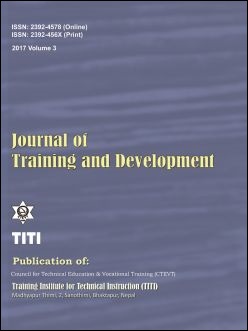National Vocational Qualification Framework (NVQF) for Nepal: Necessity or Waste of Money? Experts’ Standpoint
DOI:
https://doi.org/10.3126/jtd.v3i0.18221Keywords:
National Vocational Qualification Framework (NVQF), National Qualification Framework (NQF), Technical and Vocational Education and Training (TVET), Recognizing Prior Learning (RPL).Abstract
A purpose of this study was to understand whether NVQF is the necessity for the sustainable prosperity of TVET sector of Nepal or just a waste of money. The study had been carried out applying qualitative methodology in the form of narrative enquiry. The understanding and perception of five TVET experts were detailed with the help of following questions, viz. (a) how do you perceive for the necessity of NVQF in Nepal and (b) what are the major challenges and how can we cope with these challenges for the successful implementation of NVQF in Nepal. The experts understanding and experiences revealed that not only NVQF but also NQF are in dire need to streamline the education system of Nepal. However, there are many challenges and issues both at the policy level and at the implementation stage. These challenges and issues need to be strategically addressed from the very beginning of the NVQF project, otherwise, it could be just like “pouring water into sand”.
Downloads
Downloads
Published
How to Cite
Issue
Section
License
Authors who publish with this journal agree to the following terms:
- Authors retain copyright and grant the journal right of first publication with the work simultaneously licensed under a Creative Commons Attribution License that allows others to share the work with an acknowledgement of the work's authorship and initial publication in this journal.
- Authors are able to enter into separate, additional contractual arrangements for the non-exclusive distribution of the journal's published version of the work (e.g., post it to an institutional repository or publish it in a book), with an acknowledgement of its initial publication in this journal.
- Authors are permitted and encouraged to post their work online (e.g., in institutional repositories or on their website) prior to and during the submission process, as it can lead to productive exchanges, as well as earlier and greater citation of published work (See The Effect of Open Access).




